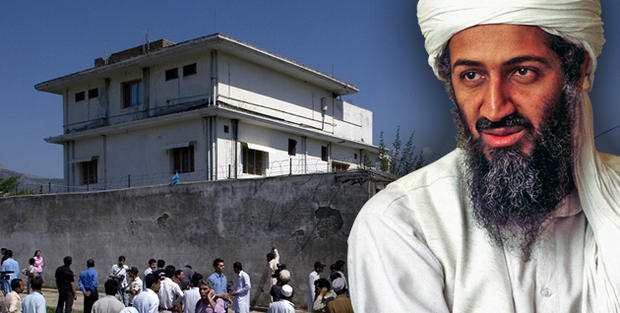Pakistan arrests CIA's informants on bin Laden
Five people who would be heroes in America are currently sitting in a Pakistani jail, having been arrested for their part in feeding the CIA information on Osama bin Laden's hideout there.
One of the men arrested includes a Pakistani Army major who officials said copied the license plates of cars visiting Bin Laden's compound in Abbottabad, The New York Times reports. Another person arrested includes the man who owned the safe house rented to the CIA while it gathered information for the May 2 bin Laden operation, the Associated Press reports.
Details of the arrests and the current condition of those arrested are sketchy. The news came to The Times from U.S. officials with knowledge of a closed briefing last week with members of the Senate Intelligence Committee and Michael J. Morell, the deputy C.I.A. director.
A Pakistani government official refused to confirm or deny the arrests in an interview Wednesday with CBS News' Farhan Bokhari.
"No one is allowed to work outside a structured framework," said the official, who spoke on the condition of anonymity. "If there have been any arrests, I suspect that's because these people were working without permission."
Two timed blasts kill 34 in Pakistan
Pakistan to Panetta: No U.S. boots on the ground
Voice of Al Qaeda: Number Two Talks Bin Laden
Special section: The killing of Osama bin Laden
Pakistan's security forces were largely seen as having been embarrassed by the bin Laden raid, as the U.S. did not announce their intentions prior to taking military action there. Pakistani officials have been quick to denounce the raid as it is apparently deeply unpopular with the general populace there.
"There is a strong feeling in the ISI (Pakistani spy agency) that they have been stabbed in the back by the CIA," a senior Western diplomat, who insisted on anonymity, told Bokhari.
Since the raid, not only have devastating attacks by Islamic militants continued in Pakistan, but so have U.S. military drone strikes on suspected al Qaeda and Taliban members in the tribal regions.
The bin Laden raid in general has built up distrust on both sides of the relationship between the Pakistan and the U.S., with Pakistani officials decrying what was seen as a unilateral strike on their soil, and U.S. officials openly questioning how bin Laden could have lived in Pakistan for so long without anyone knowing about it.
Additionally, U.S. officials have begun to question whether the America should continue to send aid to Pakistan, which so far has amounted to $20 billion since 2001. Sen. Dick Luger (R-Ind.), the ranking Republican on the Senate Foreign Relations Committee, issued a statement after the raid that detailed the reasons it has been so difficult to deal with Pakistan's leadership:
"One of the main problems in dealing with Pakistan is that its government is not a monolith, but rather a collection of different power centers that interact in complex ways. There is the elected civilian government, which over the years has not always been strong or stable; the uniformed military, which has seized power at various junctures; the intelligence service, which has its own independence within the military; and, we are told, a shadowy group of former intelligence agents that can act on its own. These different actors alternately compete and cooperate with one another, and their influence periodically waxes and wanes. Equally vexing, each of the players can support U.S. policies one moment, but obstruct them the next. Add to this mix volatile public elements that can be whipped into an anti-American fervor, and you have a partner who can seem, as some have said, to be both firefighter and arsonist."
